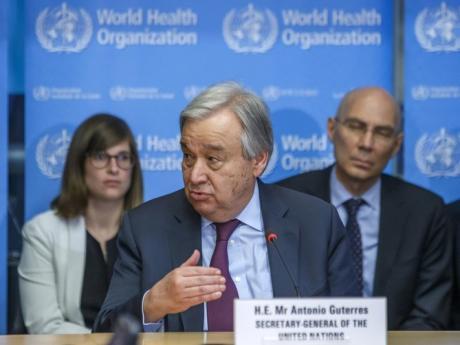Relief for heavily indebted countries like Jamaica needed now, urges UN head
Paul Clarke, Gleaner Writer
Unless the world is unified in its outlook, the COVID-19 pandemic will cause unimaginable suffering across the world, Antonio Guterres, United Nations Secretary General has warned.
He was addressing a high-level virtual meeting of world leaders, co-convened with Jamaica’s Prime Minister Andrew Holness and Canadian Prime Minister Justin Trudeau.
Holness described the pandemic as a "wake-up call for the international community to reinvigorate a comprehensive system of global economic governance, one that can cope with global disruptions while promoting inclusive development.”
He remarked that without such strategic response amid declining economic growth and increasing uncertainty, the social and economic fallout could persist.
Holness further said that access to liquidity support for developing countries that can least withstand shocks to their respective economies is key.
"But the bigger challenge for the international financial system is to channel public private credit flows into productive, inclusive developmental capital formation," said Holness.
Guterres stated that the pandemic has demonstrated the fragility of the globe.
“Despite all the technological and scientific advances of recent decades, we are in an unprecedented human crisis because of a microscopic virus,” he said.
Solidarity
He highlighted the importance of solidarity at this time as the world confronts the potential ravages of the global economic system and its impact on respective countries.
Guterres said that some 60 million more people could fall into extreme poverty and that there could be a loss upward of $8.5 trillion in global output, the largest decline since the Great Depression of the 1930s.
“A key aspect of solidarity is financial support. I welcome the swift actions that have already been taken by the International Monetary Fund, the World Bank Group, the regional development banks and other international financial institutions and the G20. But many developing countries lack the means to fight the pandemic, and to invest in recovery,” he said.
Guterres stated that the rush to safety has triggered a drainage of capital from some key emerging economies and that other countries have seen their fiscal space reduced by the virtual standstill of economic activity.
“This is where the health crisis meets the economic crisis, in a dangerous nexus that could prolong and deepen both,” he said.
“I recently had the opportunity to visit several Caribbean and Pacific islands – middle-income countries that have made steady economic progress, despite being on the frontlines of the climate crisis. Thanks to early and decisive action, they have largely been spared the health impact of COVID-19. But many are heavily indebted, and their economies are now in free fall,” he added.
Follow The Gleaner on Twitter and Instagram @JamaicaGleaner and on Facebook @GleanerJamaica. Send us a message on WhatsApp at 1-876-499-0169 or email us at onlinefeedback@gleanerjm.com or editors@gleanerjm.com.

